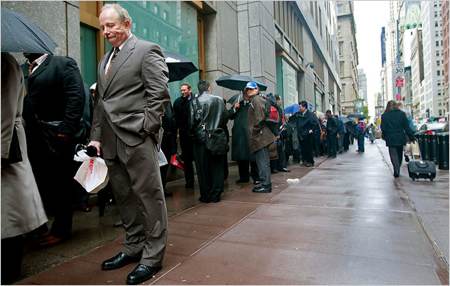Title : Unemployment Insurance
link : Unemployment Insurance
Unemployment Insurance
Unemployment Insurance also known as Unemployment benefits, unemployment compensation, or the dole are social welfare payments made by the state or other authorized bodies to unemployed people. Benefits may be based on a compulsory para-governmental insurance system. Depending on the jurisdiction and the status of the person, those sums may be small, covering only basic needs, or may compensate the lost time proportionally to the previous earned salary.
Unemployment benefits are generally given only to those registering as unemployed, and often on conditions ensuring that they seek work and do not currently have a job.
In some countries, a significant proportion of unemployment benefits are distributed by trade/labour unions, an arrangement known as the Ghent system.
The idea of unemployment insurance in the United States originated in Wisconsin in 1932. There are about 50 state unemployment insurance programs plus one each in the District of Columbia, Puerto Rico and United States Virgin Islands. Through the Social Security Act of 1935, the federal government of the United States effectively encouraged the individual states to adopt unemployment insurance plans.
Are you eligible?
People that are out of work who do not qualify for unemployment insurance include part-time, temporary, and self-employed workers, and school graduates.
Here are reasons unemployment benefits would be declined:
1. not being able or available to work
2. voluntary separation from work without a good cause
3. discharge connected to misconduct
4. refusal of suitable work
5. unemployment resulting from a labor dispute
6. Failing a drug test
7. Committing fraud
8. Receiving severance pay
9. Getting freelance assignments
Generally, the worker must be unemployed through no fault of his/her own. The unemployed person must also meet state requirements for wages earned or time worked during an established period of time (referred to as a “base period”) to be eligible for benefits. In most states, the base period is usually the first four out of the last five completed calendar quarters prior to the time that the claim is filed. Unemployment benefits are based on reported covered quarterly earnings. The amount of earnings and the number of quarters worked are used to determine the length and value of the unemployment benefit. The average weekly payment is $293.
As a result of the American Recovery and Reinvestment Act passed by Congress in February 2009, many unemployed people can receive up to 99 weeks of unemployment benefits; this may depend on State legislation. Before the passage of the American Recovery and Reinvestment Act, the maximum number of weeks allowed was 26.
Quitting does not automatically disqualifies you from unemployment compensation. You can quit and still get benefits.
Maximum weekly benefits range from a low of about $200 in Alabama, Florida, Mississippi, South Dakota and Arizona to a high of about $600 in Massachusetts, New Jersey, and Washington.
Whether you can quit and still qualify for unemployment benefits also varies from state to state. So before you quit, check the laws in your state.
If you quit because your employer basically leaves you no other option, you may still be able to collect unemployment benefits. Here are some reasons for quitting that may fall into this category:
1. Lack of work. If your employer stops giving you work, or cuts your hours severely, you’ll probably still qualify for unemployment benefits. Some employers try this as a trick to avoid paying increased premiums. Apply anyway.
2. Constructive discharge. If working conditions are so intolerable that no reasonable person would stay, you may have been constructively discharged, which means that unemployment will treat quitting the same as if you were fired without cause. Constructive discharge is really tough to prove, so make sure your situation is severe before you quit. Sexual harassment, dangerous working conditions that the company won’t fix, or demanding that you participate in illegal activities may justify quitting and still qualify you for unemployment. Demotion, changes in job duties and pay cuts may also be constructive discharge.
3. Medical reasons. In some states, having a medical condition that keeps you from working won’t disqualify you. In others, it will, or you might not qualify unless work caused or aggravated the medical condition.
4. Domestic violence. Some states allow employees who must quit because of domestic violence to qualify for unemployment benefits.
5 .Caring for a family member who is ill. Some states allow employees who must quit to care for a seriously ill family member to qualify.
Thus this article Unemployment Insurance
that is all articles Unemployment Insurance hopefully can provide benefits to all of you . Okay , see you on the other articles.
now you read article Unemployment Insurance with address link http://exclusive-newcars.blogspot.com/2013/09/unemployment-insurance.html








0 Response to "Unemployment Insurance"
Post a Comment